Archive for the ‘Quentin Tarantino’ Category
Acting as Artifice
Once Upon a Time in Hollywood

Director: Quentin Tarantino
Cast: Leonardo di Caprio, Brad Pitt, Margot Robbie, Emile Hirsch, Bruce Dern, Dakota Fanning, Maya Hawke, Timothy Olyphant, Austin Butler, Damian Lewis, Al Pacino, Kurt Russell, Margaret Qualley, Damon Herriman, Mikey Madison
Running Time: 2 hours and 41 minutes
Film Rating: 8 out of 10
Oscar winner for Best Original Screenplay for Pulp Fiction and Django Unchained, writer and director Quentin Tarantino returns to the big screen with his 9th feature film the brilliantly titled Once Upon a Time in Hollywood starring Oscar winner Leonardo DiCaprio (The Revenant) and Brad Pitt as buddies actor Rick Dalton and his stunt double Cliff Booth in a fictional tale set in Los Angeles in 1969.
1969 was the year that the real life film director Roman Polanski’s pregnant wife Sharon Tate was brutally murdered by the followers of the Charles Manson cult which shocked the American film industry to its rotten core. Charles Manson is played in the film by Australian actor Damon Herriman.
Firstly two disclaimers: this is an extremely long film and secondly it’s really only aimed at serious movie buffs and serves as Tarantino’s ode to the end of Hollywood’s Golden Age before the film making industry got taken over by corporations, sequels, digitization and streaming.
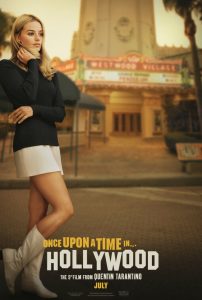
Tarantino artfully pays homage to the act of buying a ticket and going to the cinema in a rather poignant scene when the young actress Sharon Tate superbly played by Oscar nominee Margot Robbie (I, Tonya) actually pays to watch a film she is starring in at a Westwood cinema.
The rest of this marvelously meandering film belongs to the two major stars, DiCaprio who is superb as the washed up TV actor Rick Dalton who is desperately trying to make a Big Screen comeback but lands up starring in a string of Spaghetti Westerns in Rome.
Oscar nominee Brad Pitt (12 Monkeys) is phenomenal as the stunt double past his prime Cliff Booth in one of his best onscreen performances yet especially the gorgeous scene when he takes his shirt off on the roof of Dalton’s Hollywood Hills mansion in the scorching Californian sun to fix the TV aerial.
Booth also inadvertently stumbles across the hippie cult followers of Charles Manson in an abandoned studio lot in Chatsworth, California featuring some great cameos by Dakota Fanning (Ocean’s 8, War of the Worlds) as Squeaky Fromme , Oscar nominee Bruce Dern (Nebraska) as George Spahn and Margaret Qualley (The Nice Guys) as the seductive hippie hitchhiker Pussycat.
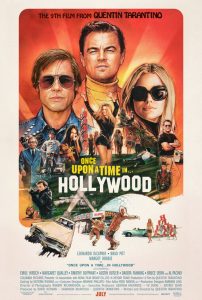
Tarantino expertly captures the zeitgeist of Los Angeles in 1969 at the peak of the counter-culture movement with lurid production design by Barbara Ling and costumes by Oscar nominated costume designer Arianne Phillips (Walk the Line, A Single Man, Nocturnal Animals, W. E.).
With some expertly placed cameos including Oscar winner Al Pacino (Scent of a Woman) as hot shot producer Marvin Schwarz and Damian Lewis as real life star Steve McQueen.
Once Upon a Time in Hollywood is slowing moving in the first two acts of the film, while the third act is phenomenal especially the hippie flame throwing sequence.
Tarantino could have quickened the film’s pace in the beginning to actively propel the narrative forward but he is a notorious auteur and not interested in packaging films to please audience expectations.
Unbelievably, Once Upon a Time in Hollywood did get a standing ovation at its glittering film premiere at the 2019 Cannes Film Festival so Tarantino did something right.
This film gets a rating of 8 out of 10 and accurately portrays acting as artifice.
This is not Tarantino’s best work but written and directed in the vein of his crime thriller Jackie Brown, Once Upon a Time In Hollywood is strictly recommended for Tarantino fans and those that enjoyed Pulp Fiction, Django Unchanged and Inglourious Basterds.
Slave to the Rhythm
Django Unchained
Director: Quentin Tarantino
Cast: Jamie Foxx, Christoph Waltz, Don Johnson, Leonardo DiCaprio, Jonah Hill, Bruce Dern, Kerry Washington, Robert Carradine, Samuel L. Jackson, Walton Goggins, James Russo
Django Unchained can be compared to a three act Southern Opera and whilst Tarantino’s distinctive style comes through, his real intention is to invert the Cowboy myth so associated with the American Wild West, channeling spaghetti Western Sergio Leone films and tackling a very prickly subject of slavery prior to the American Civil War without much sensitivity.
Django Unchained, loosely based on the 1966 Sergio Corbucci Western Django, starts off in Texas in 1858, two years before the outbreak of the American Civil War and features the eloquent and unorthodox Dr King Schultz played with superb panache by Christoph Waltz, who won a Oscar for Best Supporting Actor for 2009’s Inglourious Basterds who frees Django from a chain gang as he needs him to identify three brothers which have a mortal bounty on their heads. Jamie Foxx (Collateral, Ray) is wonderfully cast as Django and throughout the two and a half hour film really displays his range as an actor complimenting the always competent Waltz as the German speaking bounty hunter.
Together Schultz and Django go in search of Django’s entrapped and estranged wife, oddly named Broomhilda, as she was bought as a slave by German immigrants. Broomhilda is now the possession of sadistic cotton plantation owner Calvin Candie, played with flourish by Leonardo di Caprio whose Mississippi plantation aptly named Candieland provides the final act in an utterly bizarre and bloody showdown between Django, Schultz and Candie.
For sheer originality, Tarantino’s films are always enjoyable and never dull, but like Inglourious Basterds and his most famous film Pulp Fiction, along with profanity there is a serious dose of vicious bloodshed. Django Unchained lacks some of the brilliance of the first two films, but the startling sound effects, outlandish scenes and revisionist plot is enough to make Django Unchained Oscar worthy especially the two central performances by Waltz and Foxx. Two criticisms’ of the film is the overuse of racist profanity which the plot revolves around especially being set in the Slave trade of the Deep South and also the film’s considerable length.
Django Unchained has some startling scenes but one got the sense that because of Tarantino’s previous successes, Harvey Weinstein has given Tarantino free reign. Free reign on the subject of the America’s Deep South from Texas to Mississippi and their sanctioning of slavery as a form of economically binding both master and slaves into a hideous socio-geograhic relationship of brutal proportions demonstrated in the cotton and tobacco plantations below the Mason-Dixon line.
Django Unchained has a fantastic musical score and soundtrack along with brilliant sound effects and sound editing especially noticeable in the showdown at Candieland. Tarantino’s old favourite Samuel L. Jackson (Pulp Fiction) is wonderfully cast as Calvin Candie’s butler Stephen and look out for Don Johnson as Big Daddy and of course the versatile Kerry Washington (The Last King of Scotland) who undergoes all sorts of torture as enslaved Broomhilda, Django’s estranged wife. Watch out for a brief appearance by Jonah Hill (Moneyball) as part of inadequate group of Ku Klux Klan members.
Warning this film is not for sensitive viewers and Django Unchained could be Tarantino’s most controversial film to date especially as he recasts the mythical American cowboy as a sharp shooting freed slave from Texas. Yet Quentin Tarantino won the 2013 Golden Globe and BAFTA Awards for Best Original Screenplay for Django Unchained so his talent is definitely acknowledged in both America and Britain.
Revisionist Cinema from Hell
Inglourious Basterds
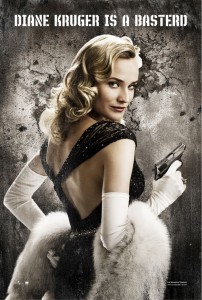
She is watching us… the Voyeur as Killer
A Revisionist look at World War 2 with all the German angst, French charm and American parody…
Sooner or later Tarantino was bound to approach the territory of the 2nd World War. While there has been a plethora of World War movies since the mid 1940s onwards, many have tackled the War from a purely Euro-American perspective focusing on the Nazi’s simply as the enemy. From Great battle films, like Saving Private Ryan to the more personal and heart-rendering stories of Sophie’s Choice and Schnindlers List and more recently Atonement.
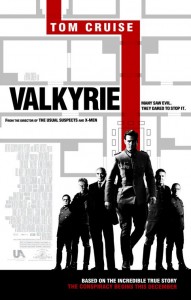
The Rot started from within…
Valkyrie arrived, Tom Cruise’s fascinating yet doomed project about a plot to kill Hitler from within the highest rankest of the Nazi inner circle in 1944. Defiance followed, a superb story of Polish Jewish resistance set in the forests outside Krakow. There was entertainment rumblings from Tarantino that after the Kill Bill films, he was planning a revisionist and slightly parodying version of World War 2…
Cannes Film Festival 2009

Cannes Film Festival 2009 and Inglourious Basterds, Tarantino’s long awaited film featuring a band of Jewish American Nazi scalp-hunters who take revenge on the Nazi’s in German-occupied France in the early 1940s is premiered much to every cineaste’s delight. Basterds is far more than a revenge cult film against Nazi’s, it’s a statement about Cinema being used as propaganda. The references are rife, for as in Pulp Fiction, Tarantino’s best trait is revealed, a rambling but significant knack for quirky dialogue. Except in this film, authenticity dictates –so naturally the French spoke French, the Nazi’s spoke German and the Americans spoke a range of regional accents from Brooklyn to Tennessee slang. Tarantino assembles some fantastic European stars of contemporary cinema, from Til Schwieger to Diane Kruger and Melanie Laurent.
Cinema as Propaganda
Tarantino makes comparisons between Joseph Goebbels – Nazi Minister for Propoganda and the then founder of MGM, Louis B. Mayer, both as masters of cinema and naturally propaganda. More specific are the references to Leni Riefenstahl, who rose to fame in the 1930s as a significant German film-maker churning out the Nazi blueprint for propaganda – Triumph of the Will.
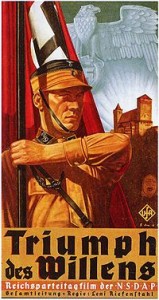
Truimph of the Will
Riefenstahl, was later vilified once the war was over and went onto to become a documentary filmmaker in East Africa. There are also a sprinkling of humorous discussions about the American black athlete Jesse Owens who sparkled at the 1936 Berlin Olympic Games much to Hitler’s dismay. Watch out for a spoof on the British military featuring a contemplative Winston Churchill and a wonderful cameo by Mike Myers whose line, “we will have all the rotten eggs in one basket” is delivered with affected panache.
A French Spaghetti Western Tarantino Style
Basterds opening shots are reminiscent of the early spaghetti Westerns of Sergio Leone – with a scene straight out of The Good, The Bad & The Ugly, except its not a dusty Mexican outback with outlaws escaping bounty hunters, it’s a pastoral scene of a French Farming countryside. This time there is no Sun-Burnt Clint Eastwood in a poncho. Enter Christoph Waltz, the urbane, elegant and lethal multi-lingual Nazi Jewish hunter. Waltz has some of the best dialogue in the film and effortlessly switches from German to French to English in order to ascertain his victims whereabouts. Yet Tarantino presents him as a man simply sent to do an unpleasant task, and one should not judge, but Waltz’s role is crucial to the films wonderful and intricate plot revolving around a cinema outside Paris and a German Film Premiere, where all plans go awry.
Christoph Waltz won an Oscar for Best Supporting Actor following in the psychopathic tradition of Javier Bardem in No Country for Old Men (2008) and Heath Ledger’s Joker in The Dark Knight (2009). Tarantino’s find of this Austrian acting talent has Hollywood virtual blogs a buzzing.
Inglourious Basterds is long, brilliant, bloody and sophisticated with that right dose of European sensibility accurately shredded by an American’s tainted perspective on World War II and more subtly a comment on the Death of original Cinema and more about Film as a nation’s propaganda tool. If you are expecting an action-packed, traditional war film with a clear division of hero and villain, well then you are simply in the wrong movie. Tarantino tantalizes, shrills and insures that any audience seeing the Basterds will feel claustrophobic and trapped in a cinema from Hell.


